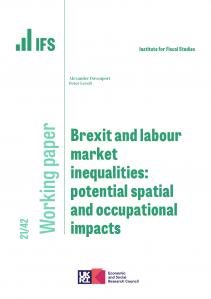This observation has been updated to reflect a clarification from Scottish Labour on their childcare policies. The party is promising first to expand the 1,140 hours of entitlement to disadvantaged 1-year-olds and all 2-year-olds. Then, within this parliament, it plans to increase the hours of entitlement for all eligible children (to a level to be decided in consultation with the sector). In the longer term Scottish Labour proposes to raise these entitlements to cover 50 hours of childcare a week, year-round.
The Scottish Labour manifesto contains an enormous number of pledges which, if delivered, would significantly expand service provision for and/or boost the take-home income of a number of groups in Scotland. These include a significant expansion of childcare and social care provision, and new and increased benefits.
On public services, the policies also continue the Scottish trend of making services free for everyone, rather than targeted on those with the lowest incomes through a means-test. The manifesto pledges to add free lunches all year round for all primary-aged children and free bus travel for the under 25s - with an ambition to make it free for all - and to abolish charges for all non-residential social care services.
On tax, the main definite commitment is a cut in business rates for non-food retail, which would only be partially paid for by higher rates on warehouses. On benefits, there is a long list of giveaways - principally to over-75s, low-income families, and people with disabilities or caring for those with disabilities. How radical and expensive a change a proposed Minimum Income Standard would be depends very much on the level at which it would be set.
Apart from the short-term COVID recovery measures, the manifesto does not provide information on how much these various pledges would cost - either individually or together - which is disappointing. But the list of policies clearly has a significant net cost in both the short and longer term.
In the short term, the cost of the proposed stimulus and recovery measures significantly exceeds the remaining funding available to the Scottish Government for this year, and would require more UK government funding to deliver. And in the long term, the ambition of a more expansive welfare state set out would require either tax rises or more UK government funding. Under current funding arrangements and plans, it is hard to see how they could be delivered without substantial increases in Scottish taxes - affecting not only those with incomes over £100,000.
Christine Farquharson, a senior research economist at the IFS who works on public spending, said
“The Scottish Labour manifesto is a somewhat strange beast - more a plan for the next 18 months and then for the next decade or more, rather than a 5-year parliamentary term.
On a range of issues, it reflects the seeming consensus in Scottish politics: doubling the Scottish child payments, universal free school lunches for primary school aged children, and scrapping non-residential social care charges, to name a few.
Where it stands out more is on the scale of short-term spending and longer-term ambitions. Other parties also set out short-term stimulus and recovery measures, but Labour’s dwarf them, and its one-off Jobs for Recovery scheme, guaranteeing 6 months of public sector employment for many of those out of work, is unprecedented in the UK. Also unprecedented in the UK is Labour’s plan to extend funded childcare entitlements to 50 hours a week, every week, for all pre-school children in the longer run - this would mean, near enough, that all formal childcare for these children is paid for by the government.
How this would all be paid for is not at all clear. The manifesto’s short-term plans exceed the Scottish Government’s unallocated funding for this year, and wouldn’t be deliverable without additional UK government funding. Longer-term plans would also require tax rises - not only affecting those earning over £100,000 - or a very substantial loosening of the purse strings by the UK government.”
COVID recovery and stimulus
Scottish Labour have entitled their manifesto their ‘National Recovery Plan’, and they set out some striking - and costly - measures to provide fiscal stimulus and support recovery over the next year. The other parties, including both the SNP and Conservatives, also have measures aimed at this, but the overall scale of Labour’s plans is bigger (although the £300m proposed to deal with NHS backlogs is actually less than proposed by the Scottish Conservatives).
The manifesto proposes temporary payments that would both help households and help the struggling retail and hospitality sector. Every adult in Scotland would receive a £75 voucher to spend in non-food shops (at a one-off cost to the Scottish Government of £341 million), and any tourist travelling within or to Scotland would receive every 3rd night of holiday accommodation free on off-peak dates between September to November 2021 (at an estimated cost of £95 million).
The stand-out proposal though is the temporary Jobs for Recovery scheme that Labour cost at £500 million. This would guarantee 6 months of employment in the public sector for all under-25s and disabled adults not already in work or education - and not already covered by the UK government’s Kickstart scheme -, as well as all other adults unemployed for at least 12 months. At least 20% of the time would be allocated to training and preparation for future employment.
Participants would be paid according to the relevant public sector payscale, and at least the Scottish Living Wage of £9.50 an hour. This is more than many of those aged under 25 would receive per hour from taking part in the UK government’s Kickstart scheme, for which the lower National Minimum Wage rates can be paid. How it compares in terms of total pay would depend on the number of hours per week the scheme covered (the Kickstart scheme provides jobs of at least 25 hours per week).
Key to its success would be the ability of public sector employers to rapidly create and manage meaningful jobs for many tens of thousands of people, ensure high-quality training and skills development, and forge links with the private sector to help participants move into sustained employment. This challenge should not be under-estimated and, implemented poorly, there would be a risk of Jobs for Recovery becoming an expensive make-work scheme, with limited long-term benefits.
These schemes are just part of the short-term spending proposed by Labour for 2021-22, to support economic and social recovery from the COVID-19 crisis. All told, they have set out about £3.2 billion of day-to-day spending and £1.2 billion of capital spending. They might be able to fund some of this - such as £300 million for dealing with NHS backlogs - from within existing budgets. But, even so, the amount of spending proposed significantly exceeds the remaining unallocated funding currently available to the Scottish Government this year (although up-to-date figures on this have not been published, we estimate it could be around £1.3 to £1.6 billion for day-to-day spending, with relatively little for capital). It is therefore difficult to see how such expansive plans would be deliverable without a further substantial top-up to the Scottish Government’s block grant by the UK government.
Health and social care spending
The Scottish Labour manifesto contains a large number of specific proposals for the NHS, with a focus on mental health services and reductions in waiting times for cancer care in particular. There are also vague hints at major structural reforms: the manifesto declares that “now is the time to transition GP services into a fully integrated NHS” - which would seemingly imply an end to the status of GPs in Scotland as independent contractors - and states that “NHS dental services need a comprehensive overhaul”. Yet despite these numerous promises and ambitions, and in contrast to the SNP and Conservative manifestos, there is no stated plan for medium- to long-term NHS funding. There is no indication, for example, of how much Scottish Labour might spend on the NHS overall, and no indication of whether the Barnett consequentials from higher NHS spending in England would be passed on in full to the Scottish NHS. It is therefore impossible to assess how NHS funding would fare under Scottish Labour, relative to the other parties.
On adult social care, the manifesto promises the creation of a National Care Service and the abolition of all non-residential charges. This offer is similar to that made by the SNP in their manifesto. This is indicative of the seeming consensus in Scottish politics for a further move towards universal public services, free at the point of use to all, and away from a system of means-testing that targets support at just the most disadvantaged. The Labour manifesto also promises to increase the wages of social care workers to £12 an hour immediately, and to £15 an hour over the course of the parliament. For most of these workers - more than 80% of whom are women - this would represent a large pay rise. Local authorities and social care providers would need a correspondingly large increase in funding in order to maintain provision in the face of a higher wage bill. Based on the broad assumptions of the Feeley review into adult social care in Scotland, an increase in hourly wages to £12 an hour could be expected to add a minimum of £250 million to the annual paybill (with Labour estimating somewhat more), with further costs associated with policies like the scrapping of non-residential charges, higher payment rates for residential care, and the relaxation of eligibility criteria so that people with less severe needs receive publicly funded care. Labour suggest that taken together, the policies would cost £667 million this year, and more in future years - but provide no details on how much more, nor on how much funding overall would be provided for social care (to cope with increases in underlying demand, for example) over the rest of this parliament.
Childcare
The Scottish Labour manifesto makes some very big promises on childcare and early learning. With a long-term ambition to extend 50 free hours a week of childcare to all pre-school children year-round, Scottish Labour’s vision for the sector appears to be that near enough all formal pre-school childcare in the country should eventually be paid for by the government.
Whenever this is to happen, it would come with a very large bill attached. The numbers here are enormously uncertain, and the final cost will depend on how many hours of childcare families with young children choose to take up.; Labour costs its first step, extending the 30-hour term-time entitlement to vulnerable 1-year-olds and all 2-year-olds, at £475 million. They then budget another £335 million for an increase in the number of hours for all eligible 1- to 4-year-olds within this parliament. Increasing these entitlements all the way up to 50 hours a week, year-round, would then be a longer-term goal.
An eventual year-round 50-hour entitlement is a major change on existing provision. At 2,600 hours a year, this entitlement would more than double the 1,140 hour offer that will be implemented this summer. Scottish Labour is promising an enormous change to the childcare system, and the party should be much clearer in its manifesto what would be delivered by when so that voters can properly scrutinise it.
Education and free school meals
Like the SNP and the Scottish Conservatives, Labour has stressed the importance of improving the education system: its third ‘National Mission’ is to move the Scottish system to the top of international league tables. But while the manifesto includes a number of promises on what it will do in the coming year or two to help children to catch up on education missed during the pandemic, there is much less about Labour’s vision for improving the school system beyond that point.
Many of the concrete pledges that Labour does make in this space are also similar to what the SNP and the Conservatives have promised. 3,000 additional teachers and perhaps 1,000 new support staff means that Labour promises a somewhat bigger hiring spree than the other two parties. Re-engaging with international assessments is in common with the Conservative manifesto, and the ambition of providing digital devices is shared with the SNP. All three parties are committed to revising the Curriculum for Excellence following an international review.
It also seems that, whatever happens this election, Scotland is set for year-round universal free school meals for all primary pupils as Labour joins the SNP and the Conservatives in making this promise. Scottish Labour has also promised holiday meal provision for secondary school pupils through holiday clubs this year. This will doubtless be welcome news for many parents - but, as always when making a means-tested benefit universal, the biggest benefits will not be enjoyed by the poorest families.
Benefits
Like the SNP, Conservatives, Liberal Democrats and Greens, Labour wants to double the Scottish child payment from £10 to £20 – though they propose to do it by the end of 2022, sooner than some of the other parties. By the end of the parliament this would cost about £180 million a year, and would equate to a giveaway averaging about £60 per year in today’s terms (0.2% of income) across all Scottish households. The gains would be highly concentrated among low-income households, peaking at £180 per year on average (1.1% of income) for the second-lowest income decile group. Campaigners have estimated that this would lift a further 20,000 children out of relative income poverty but would not be enough to meet Scotland’s child poverty targets, unless there were increases in parental employment or wages.
Like the SNP, Labour also wants to introduce a guaranteed minimum income - and, as with the SNP, it is not clear how radical this would be in practice. Arguably, the UK already has a minimum income guarantee in the form of universal credit. A key question is whether Scottish Labour essentially wants to make that more generous, or to make it more truly ‘guaranteed’ by removing the restrictions that currently prevent some low-income families from receiving it (such as work search requirements and asset limits).
Unlike the parties mentioned above, Scottish Labour wants to introduce a new payment of £159 a year for all households containing someone aged 75 or over. Labour says this would cost £59 million a year. This is intended to cover the cost of TV licences or internet and connectivity bills (£159 is the cost of a TV licence), but there is no obligation for recipients to spend the money on those things and those receiving pension credit are already eligible for a free TV licence. The incomes of households containing someone aged 75 or over have grown faster than those of the rest of the population over the past 20 years, and while their average incomes are still slightly below the average for the population as a whole, they are now less likely than others to be in poverty (after accounting for their lower housing costs).
The manifesto also includes a long list of other benefit increases Scottish Labour would like to introduce, including eliminating the benefit cap and the two-child limit on means-tested benefit entitlements, making the current Covid-related £20-a-week universal credit uplift permanent, making additional payments to students and to unemployed people doing training, increasing carer’s allowance, increasing the Scottish child payment by a further £5 for disabled children, and extending eligibility for various disability and carers’ benefits to a wider group.
No doubt the beneficiaries of all these policies would welcome this largesse. The question - left unanswered - is how they would be paid for.
Taxes
The manifesto’s most definite and specific tax policy is to reduce business rates by 20% for non-grocery bricks-and-mortar businesses and increase it by 20% for retail warehouses from 2022-23 (with an interim one-off reduction for non-food shops in 2021-22). This would be a net tax cut, since shops make up much more of the tax base than warehouses.
But that is just the start. In the longer term, Labour wants ‘a complete review of taxes levied by local government.’ This includes reforming business rates ‘to ensure the digital economy makes a fair contribution’, and replacing council tax with ‘a fairer alternative based on property values and ability to pay’. Labour also wants to ‘explore’ a variety of other possible new taxes, including on land value and on pollution, though these are not firm commitments. These are all potentially radical reforms - and there is certainly room for significant improvement - but clearly Labour has more policy development work to do before we could know quite what they would mean in practice.
Scottish Labour seems more definite in saying it would levy an additional tax on alcohol sales, as part of a strategy to reduce alcohol consumption. But the Scottish Government does not currently have the power to do so. So, taking forward such a policy would mean first requesting the powers from the UK government, which may not be granted.
On the Scottish Government’s biggest existing revenue-raiser, income tax, Scottish Labour says it would seek to avoid increases at the moment but would support increases for those earning over £100,000 a year ‘if there is a need’. Given the difficulty of introducing major new taxes quickly under the Scottish Government’s current powers, and given the likely cost of Labour’s many spending commitments, it seems likely that there would be a need for this - and much more.












